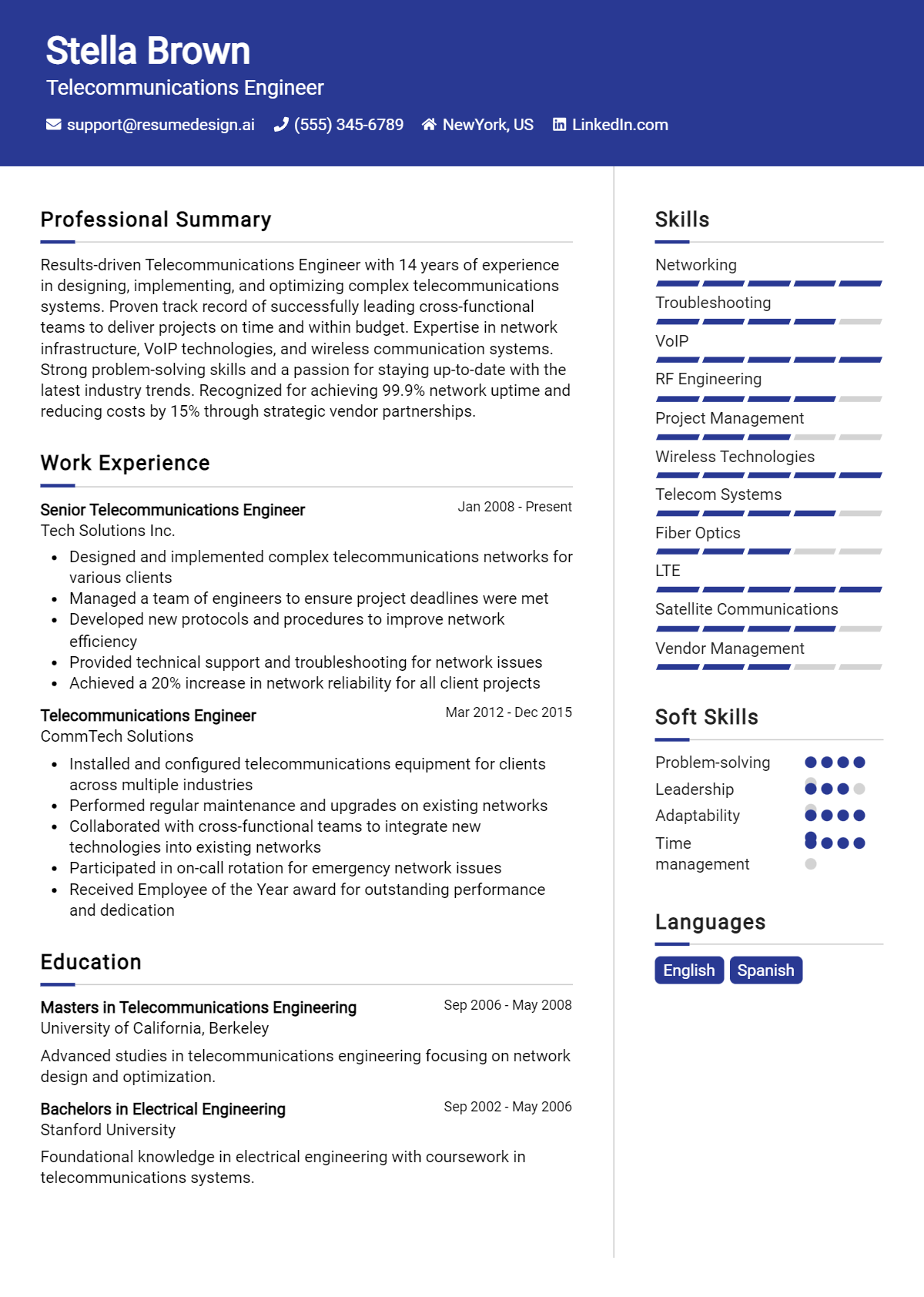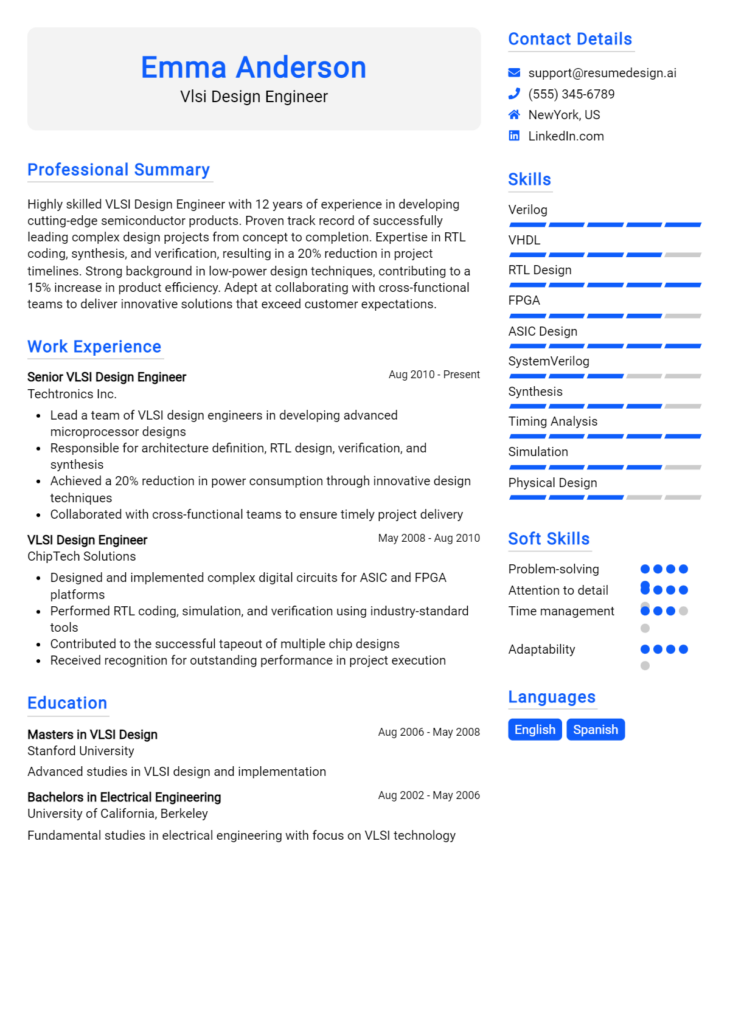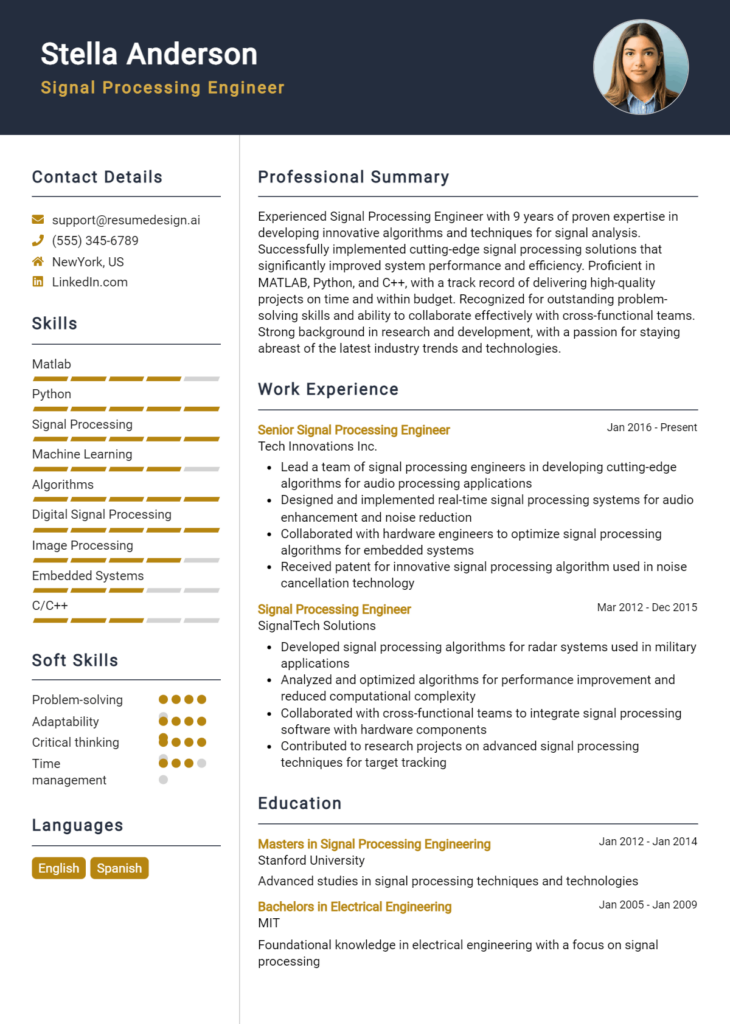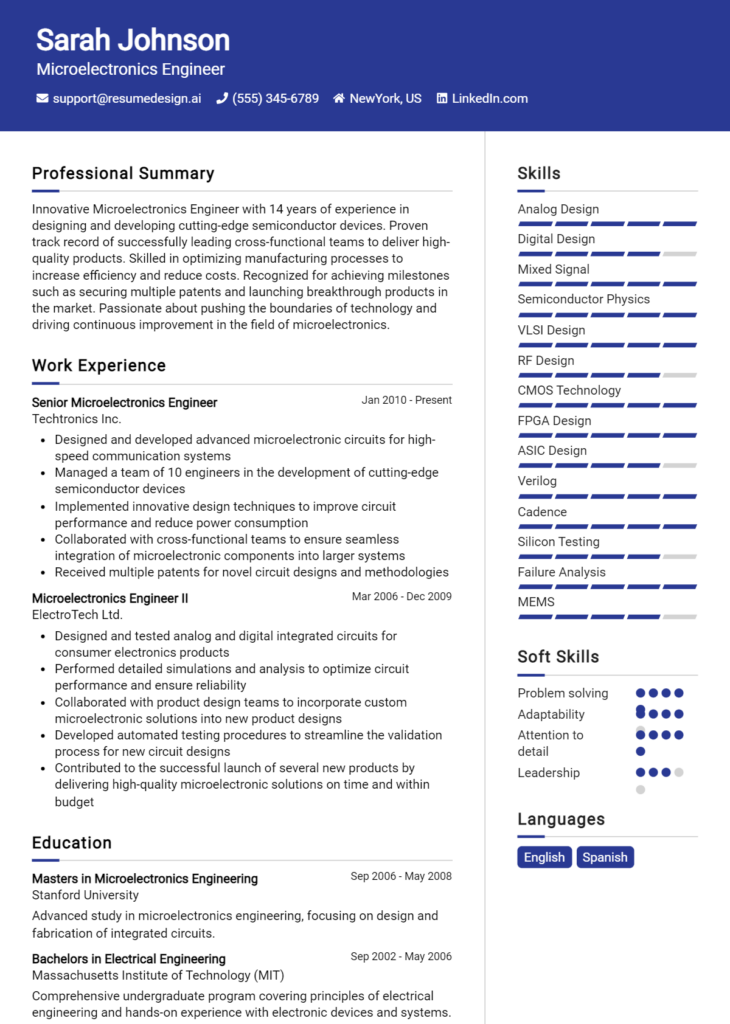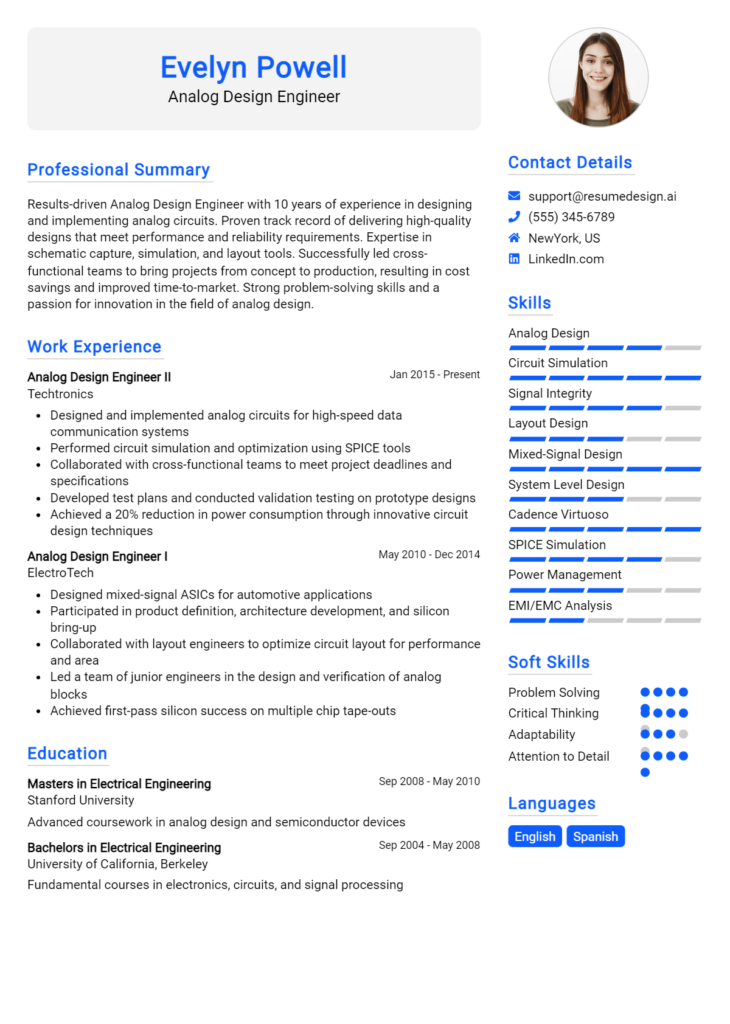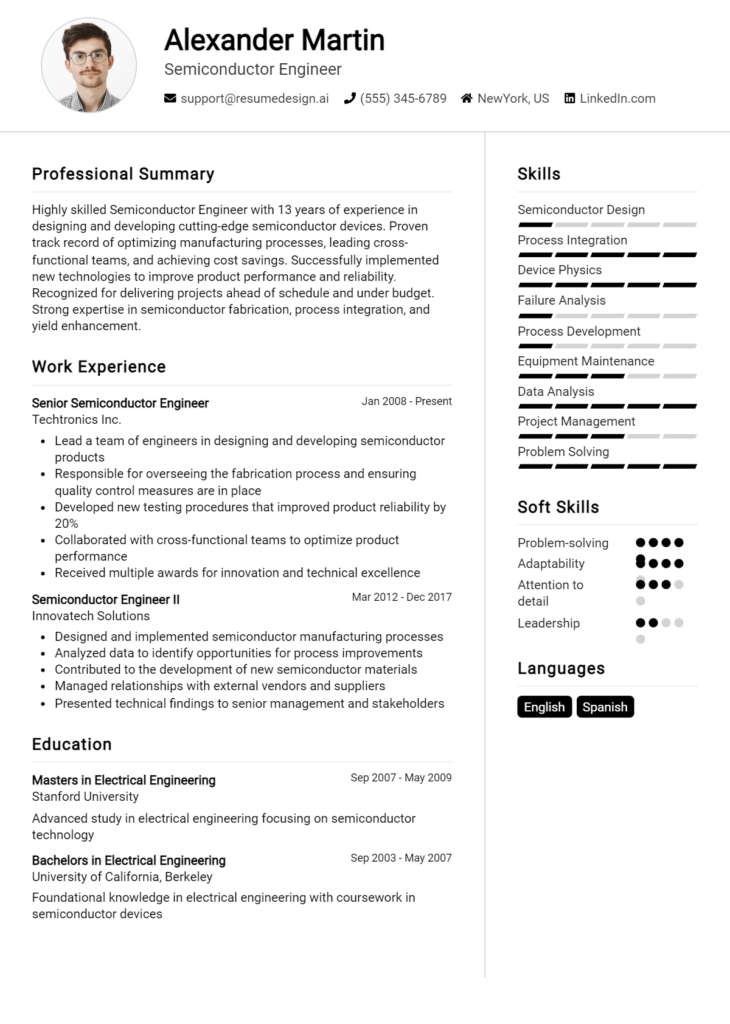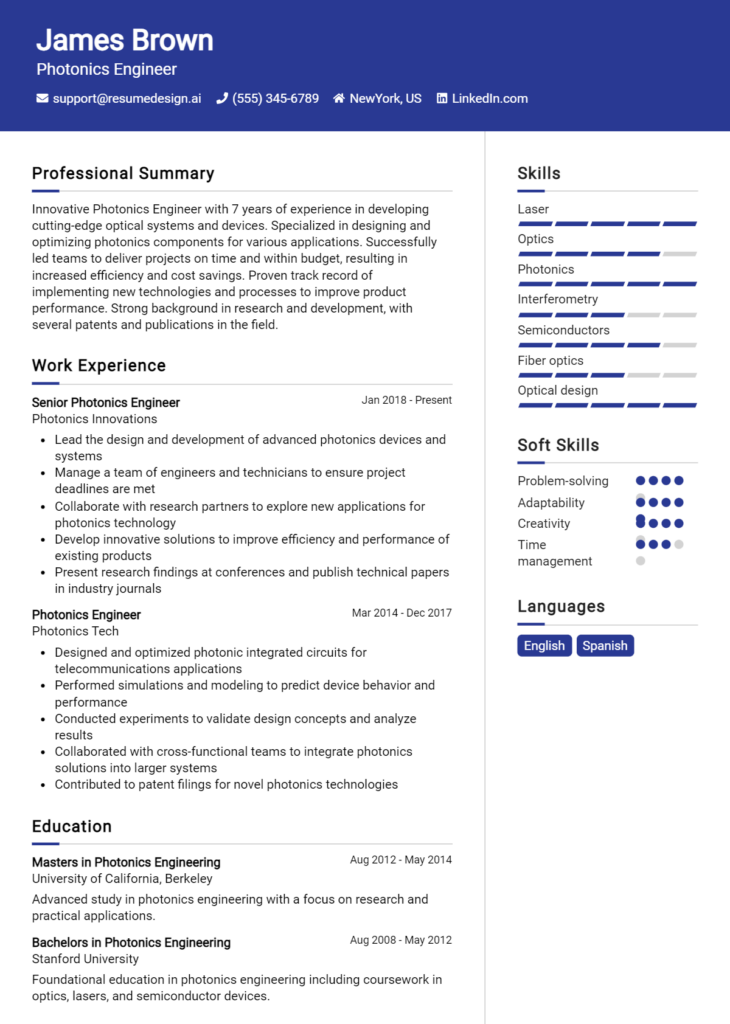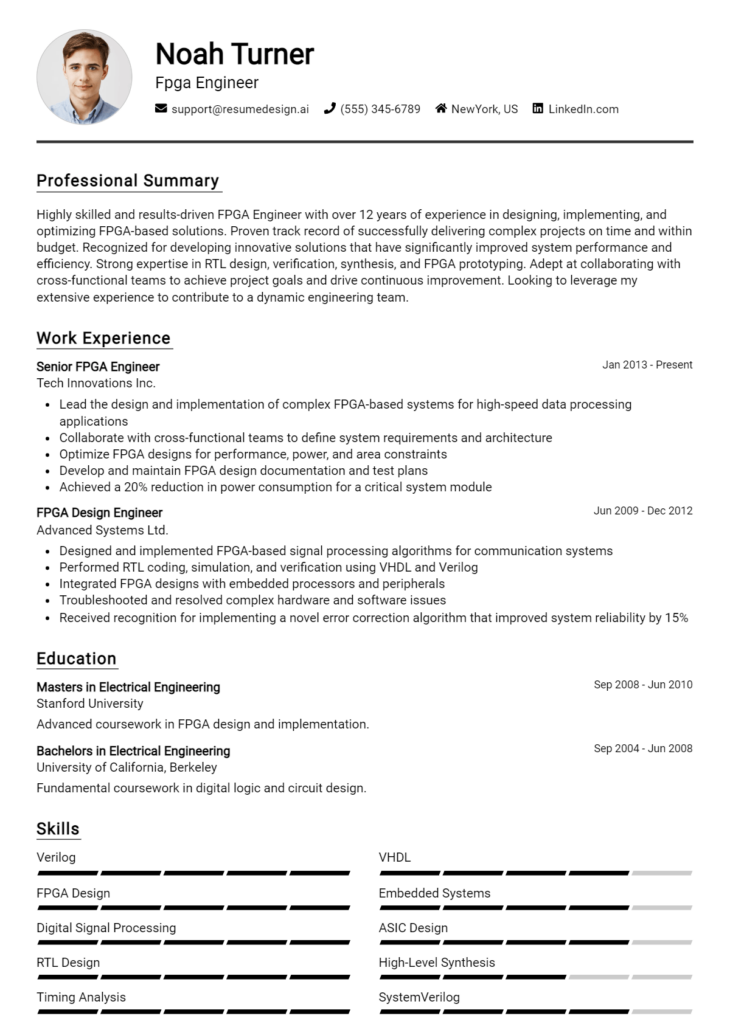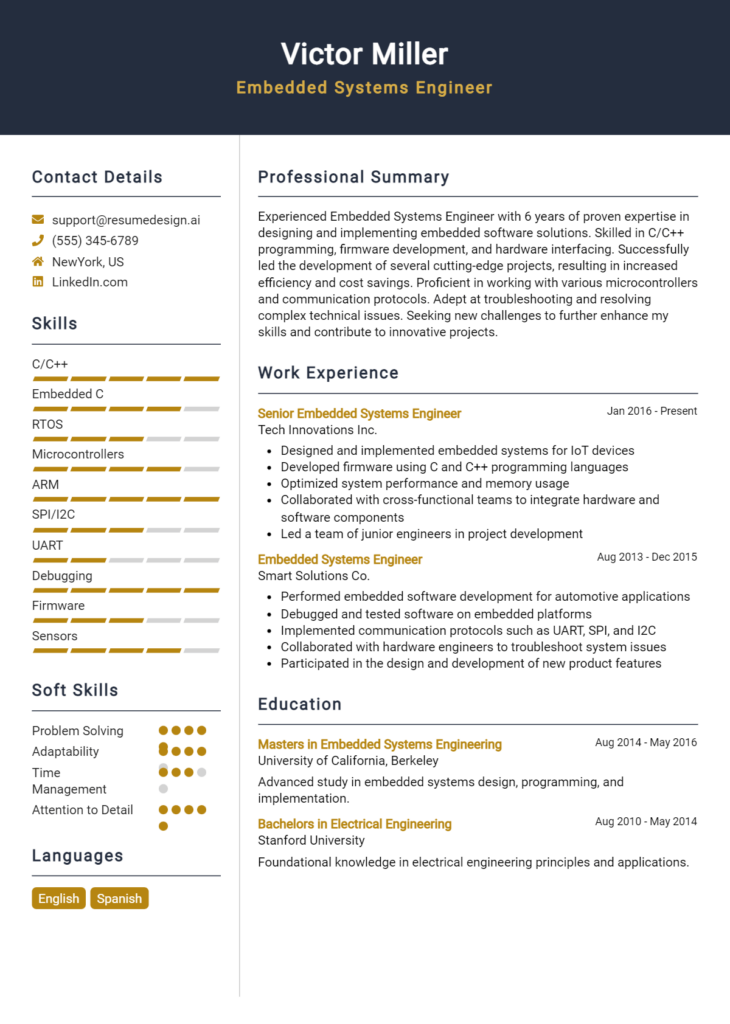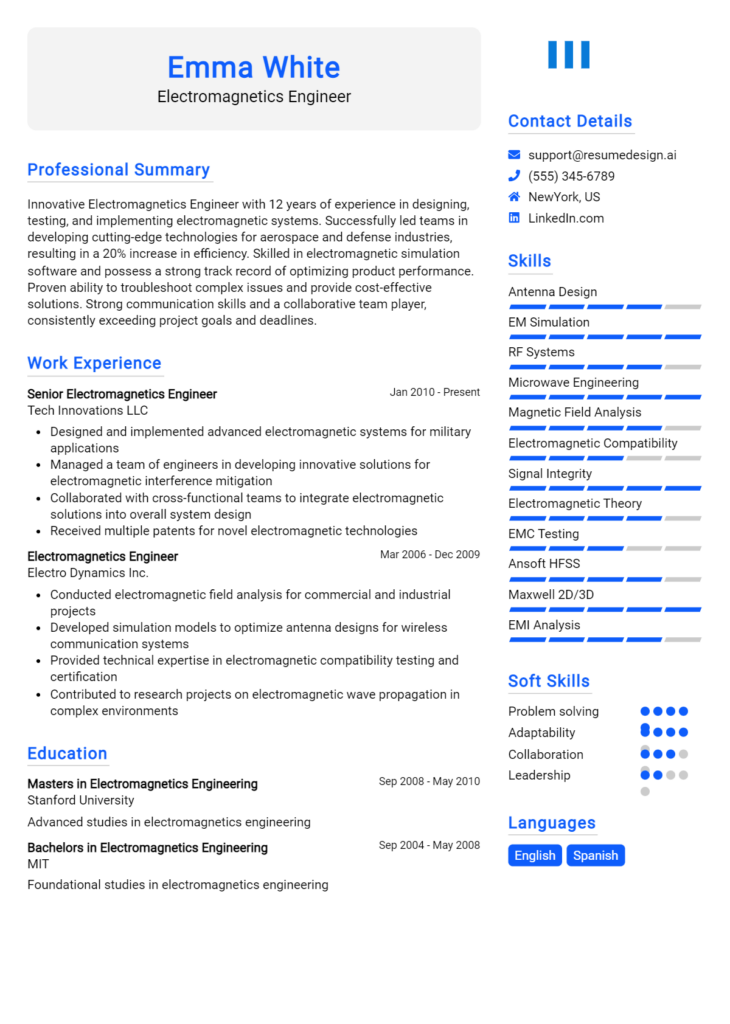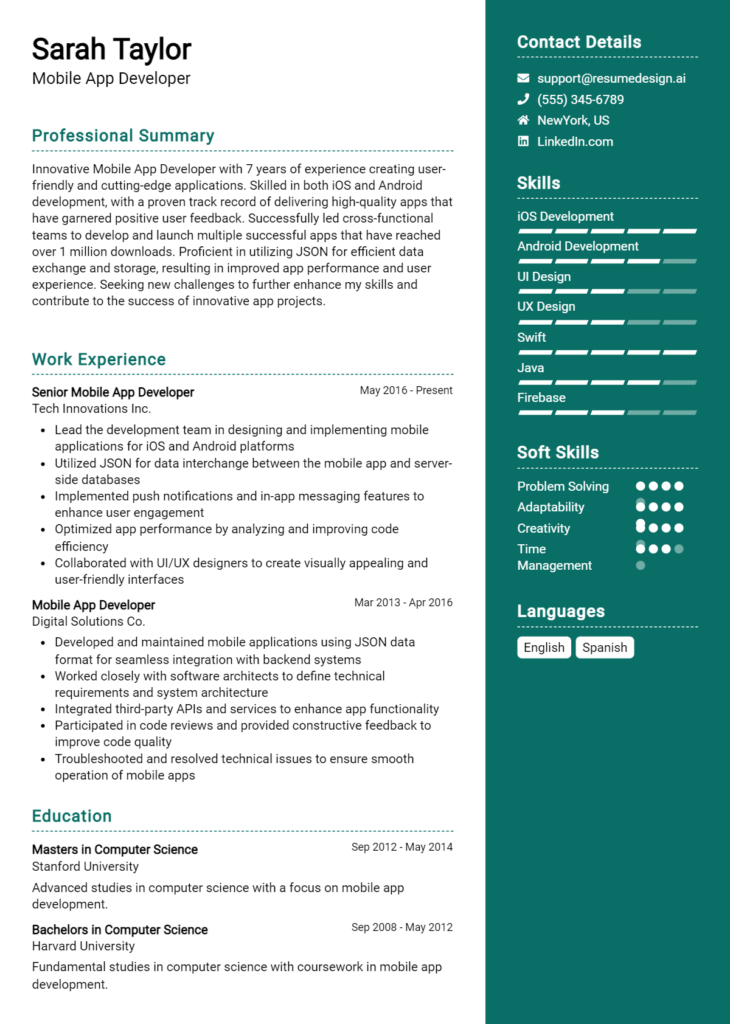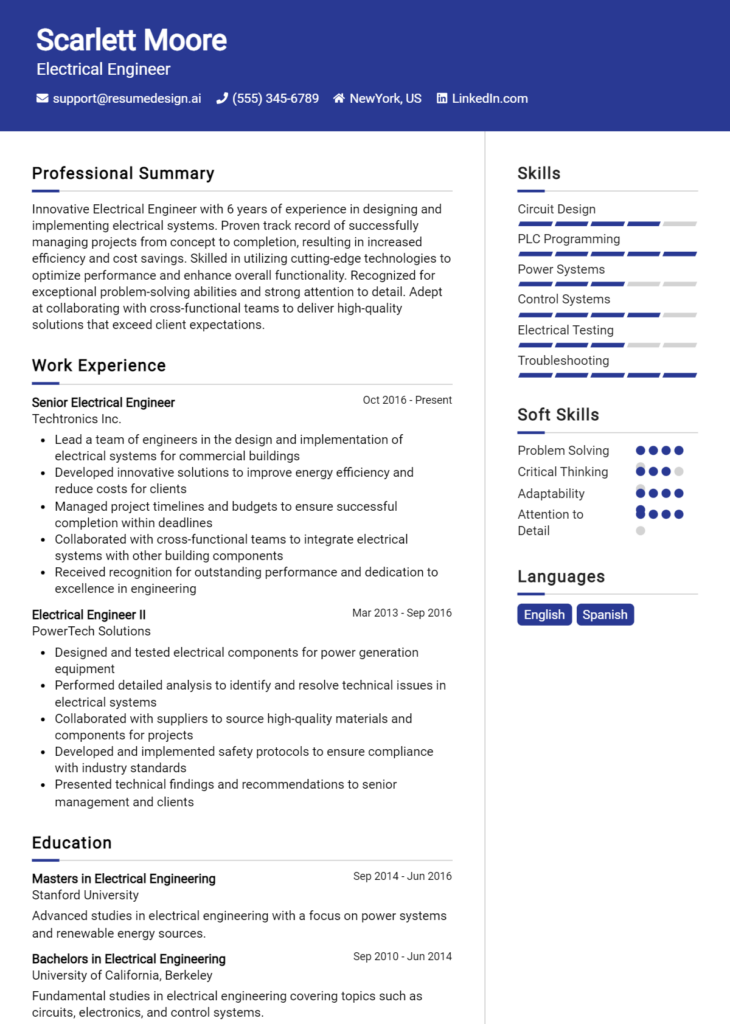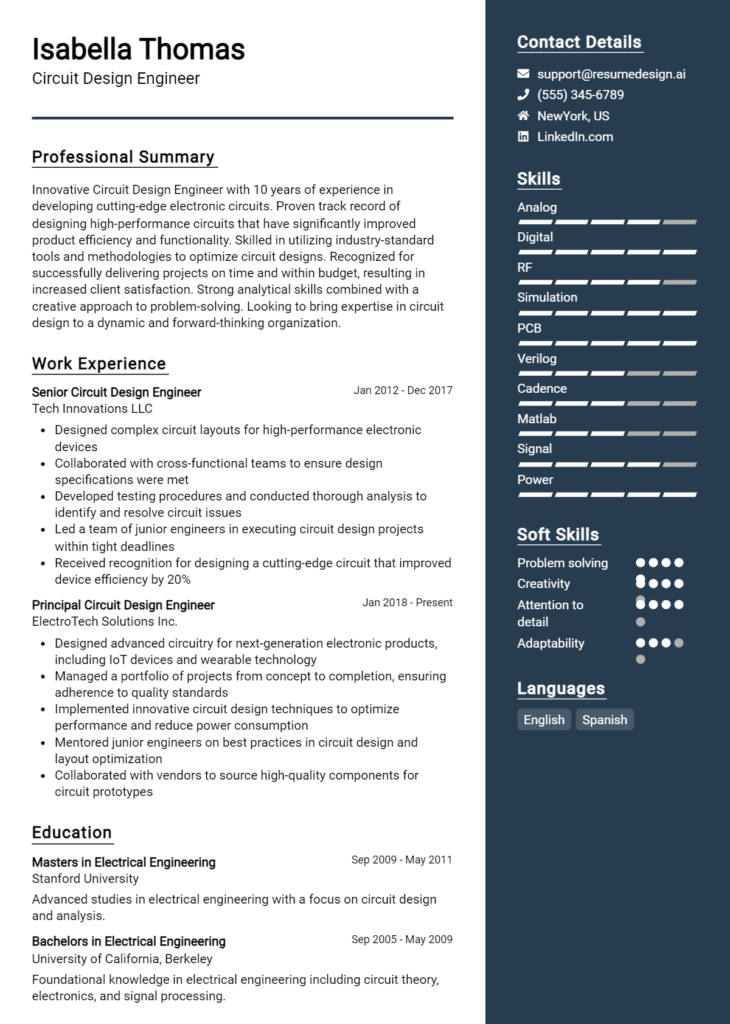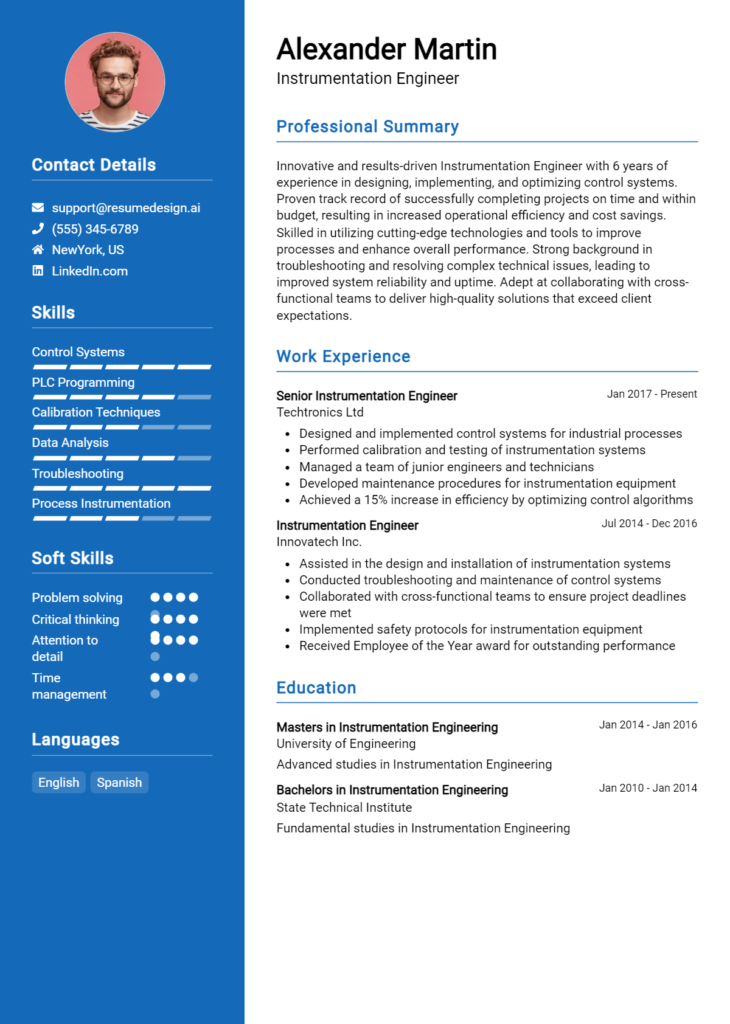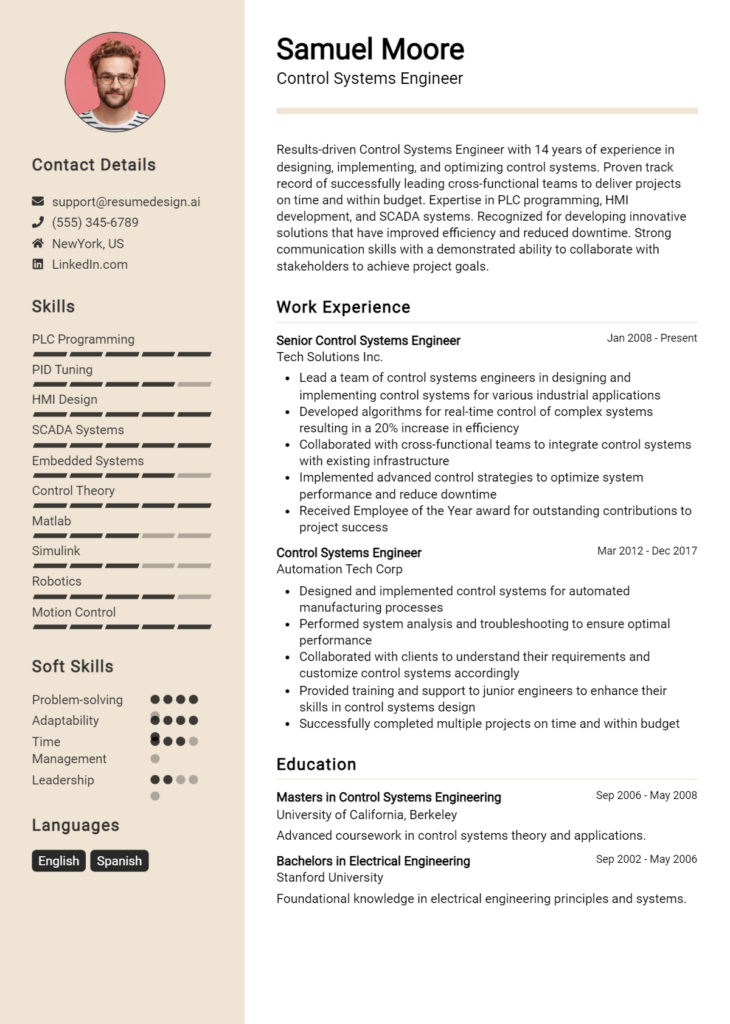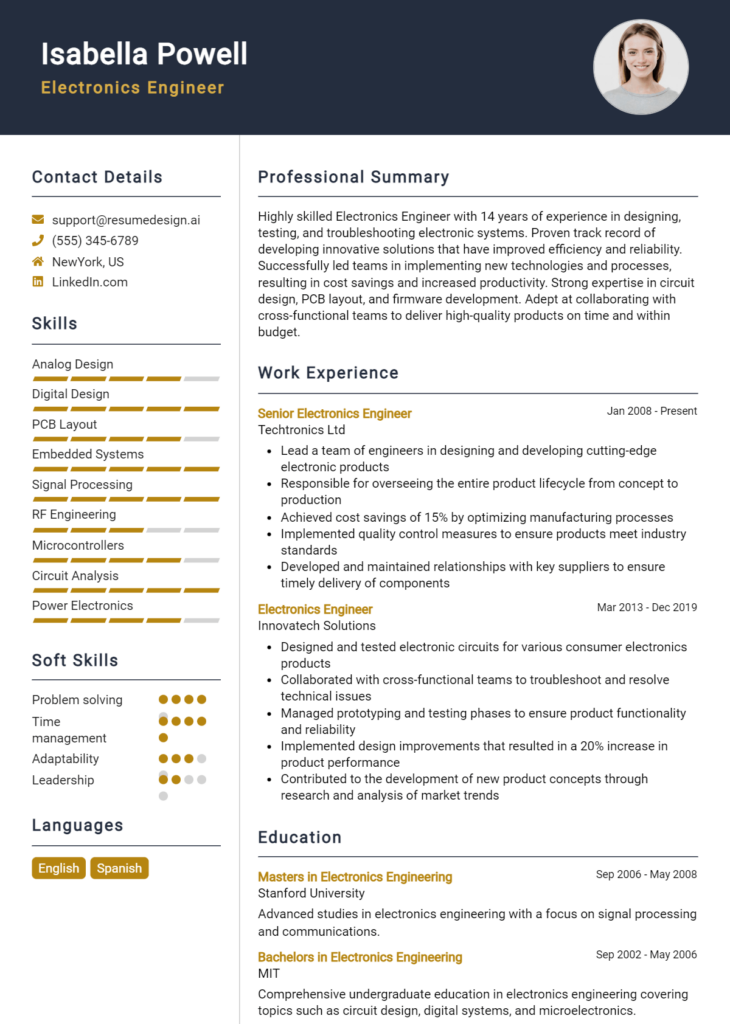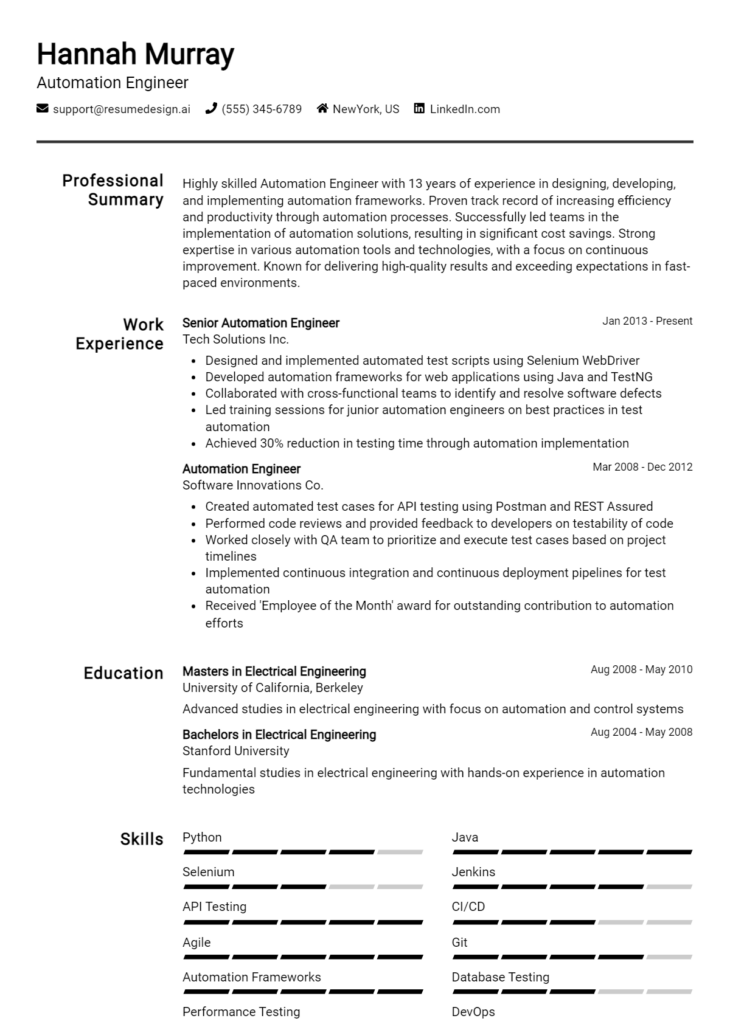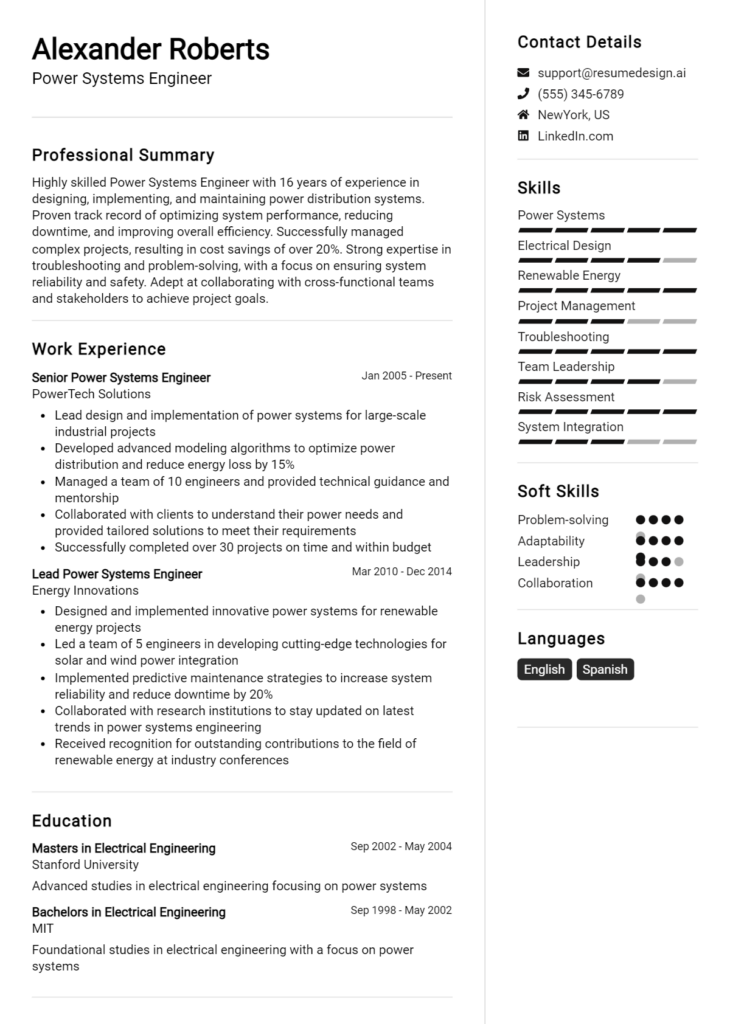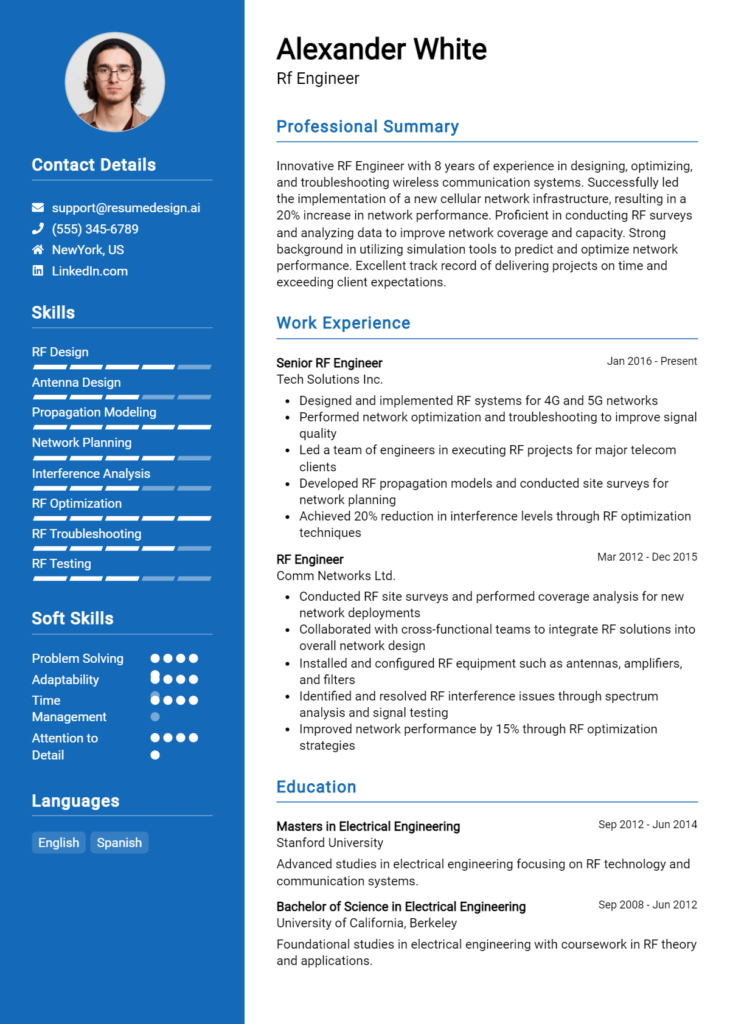Telecommunications Engineer Core Responsibilities
A Telecommunications Engineer is responsible for designing, implementing, and maintaining communication systems and networks. This role requires a blend of technical expertise in telecommunications technologies, operational knowledge across departments, and strong problem-solving abilities to ensure seamless connectivity. Successful engineers collaborate with IT, project management, and customer service teams, aligning technical solutions with organizational goals. A well-crafted resume highlighting these skills demonstrates one’s qualifications, making a significant impact on career advancement opportunities.
Common Responsibilities Listed on Telecommunications Engineer Resume
- Design and develop telecommunications systems and network architecture.
- Install, configure, and maintain telecommunications equipment.
- Monitor network performance and troubleshoot issues as they arise.
- Collaborate with cross-functional teams to implement communication solutions.
- Conduct site surveys and analyze customer requirements for services.
- Prepare technical documentation and user manuals for systems.
- Ensure compliance with industry standards and regulations.
- Perform regular maintenance and upgrades on telecommunication systems.
- Evaluate new technologies and recommend enhancements for network performance.
- Provide technical support and training to staff and clients.
- Manage project timelines and budgets effectively.
High-Level Resume Tips for Telecommunications Engineer Professionals
In the competitive field of telecommunications engineering, a well-crafted resume is not just a document; it's your first opportunity to make a lasting impression on potential employers. Your resume serves as a powerful marketing tool that reflects not only your technical skills but also your achievements and contributions to previous projects. Given the rapid advancements in technology and the specific requirements of telecommunications roles, it is crucial to present a resume that is clear, concise, and tailored to highlight your unique qualifications. This guide will provide practical and actionable resume tips specifically designed for Telecommunications Engineer professionals, ensuring that your application stands out in a crowded job market.
Top Resume Tips for Telecommunications Engineer Professionals
- Tailor your resume to the specific job description, incorporating relevant keywords and phrases to match the employer’s requirements.
- Showcase your relevant experience by detailing specific projects you’ve worked on, including your role and the technologies used.
- Quantify your achievements with metrics, such as cost savings, project completion times, or performance improvements, to demonstrate your impact.
- Highlight industry-specific skills, such as knowledge of network protocols, telecommunications regulations, and experience with relevant software tools.
- Include certifications and professional development courses that are relevant to telecommunications engineering, such as CCNA or PMP.
- Utilize a clean and professional format that enhances readability and allows key information to stand out.
- Incorporate a summary statement at the beginning of your resume that encapsulates your experience, skills, and career objectives.
- Use action verbs to describe your responsibilities and accomplishments effectively, giving a sense of initiative and contribution.
- Keep your resume concise, ideally one to two pages in length, focusing on the most relevant information that aligns with the job.
- Proofread your resume for spelling and grammatical errors, as attention to detail is crucial in the engineering field.
By implementing these tips, you can significantly enhance your chances of landing a job in the telecommunications engineering field. A well-structured and targeted resume not only showcases your skills and achievements but also demonstrates your understanding of the industry, making you a compelling candidate for potential employers.
Why Resume Headlines & Titles are Important for Telecommunications Engineer
In the competitive job market for Telecommunications Engineers, a well-crafted resume headline or title serves as an essential tool for making a strong first impression. A powerful headline can instantly capture the attention of hiring managers, succinctly summarizing a candidate's most relevant qualifications and expertise in a single impactful phrase. This brief statement should be concise, relevant, and directly aligned with the job being applied for, allowing hiring managers to quickly gauge the applicant's potential fit for the role. A strong headline not only differentiates a candidate from others but also sets the tone for the rest of the resume.
Best Practices for Crafting Resume Headlines for Telecommunications Engineer
- Keep it concise: Aim for one to two lines that clearly convey your expertise.
- Be role-specific: Tailor the headline to align with the specific job requirements.
- Highlight key skills: Focus on the most relevant skills that are in demand for the position.
- Use industry terminology: Incorporate terms and jargon that resonate within the telecommunications field.
- Quantify achievements: If possible, include metrics that demonstrate your impact in previous roles.
- Avoid buzzwords: Stay clear of clichés that do not add value to your headline.
- Reflect your career level: Indicate whether you are an entry-level, mid-level, or senior engineer.
- Make it compelling: Use powerful language that conveys confidence and expertise.
Example Resume Headlines for Telecommunications Engineer
Strong Resume Headlines
Experienced Telecommunications Engineer Specializing in Network Optimization and Design
Results-Driven Telecommunications Expert with 10+ Years in Wireless Infrastructure Development
Telecommunications Engineer with Proven Track Record in 5G Implementation and Project Management
Weak Resume Headlines
Telecommunications Engineer Looking for Job
Engineer with Experience in Telecommunications
The strong headlines are effective because they clearly articulate the candidate’s strengths and specific areas of expertise, making it easy for hiring managers to see their value at a glance. They are also tailored to the telecommunications field, using industry-specific language that resonates with employers. In contrast, the weak headlines lack specificity and fail to convey any unique qualifications, making them forgettable and less likely to engage hiring managers’ interest. They do not provide any measurable achievements or insights into the candidate’s capabilities, which diminishes their overall impact.
Writing an Exceptional Telecommunications Engineer Resume Summary
A well-crafted resume summary is a crucial element for Telecommunications Engineers seeking to make a strong impression on hiring managers. This brief yet powerful section serves as the first point of contact, quickly capturing attention by highlighting key skills, relevant experience, and significant accomplishments. An effective summary is concise and impactful, tailored specifically to the job at hand, allowing candidates to differentiate themselves amidst a competitive job market. A strong summary not only showcases technical expertise but also aligns with the employer's needs, setting the stage for a compelling application.
Best Practices for Writing a Telecommunications Engineer Resume Summary
- Quantify Achievements: Use numbers and metrics to demonstrate the impact of your work, such as cost savings or project completion times.
- Focus on Key Skills: Highlight technical skills relevant to telecommunications, such as network design, troubleshooting, and project management.
- Tailor the Summary: Customize your summary for each job application to reflect the specific requirements and keywords from the job description.
- Emphasize Relevant Experience: Concentrate on experiences that directly relate to the telecommunications field or the position you are applying for.
- Use Action-Oriented Language: Start sentences with strong action verbs to convey a sense of proactivity and accomplishment.
- Keep It Concise: Aim for 3-5 sentences that succinctly encapsulate your professional identity and value proposition.
- Showcase Soft Skills: Include interpersonal skills that are valuable in team environments, such as communication, collaboration, and problem-solving.
- Maintain Professional Tone: Use a formal yet engaging tone that reflects professionalism and confidence in your abilities.
Example Telecommunications Engineer Resume Summaries
Strong Resume Summaries
Results-driven Telecommunications Engineer with over 7 years of experience in designing and implementing advanced communication systems. Successfully reduced network downtime by 30% through proactive maintenance and troubleshooting, enhancing overall service reliability.
Detail-oriented Telecommunications Engineer with a proven track record of managing multi-million dollar projects. Led a team that completed a nationwide fiber-optic deployment six months ahead of schedule, resulting in a 25% increase in customer satisfaction ratings.
Innovative Telecommunications Engineer skilled in wireless network design and optimization. Achieved a 40% improvement in signal coverage while reducing operational costs by 15% through strategic upgrades and resource allocation.
Weak Resume Summaries
Telecommunications Engineer with experience in the field looking for a new opportunity to grow.
I have worked on various telecommunications projects and have some technical skills.
The strong resume summaries are effective because they provide specific examples of achievements, quantifiable results, and relevant skills that directly relate to the telecommunications engineering role. They demonstrate the candidate's impact and expertise in the field. In contrast, the weak summaries lack detail, specificity, and measurable outcomes, making them appear generic and less compelling to potential employers.
Work Experience Section for Telecommunications Engineer Resume
The work experience section of a Telecommunications Engineer's resume is a critical component that communicates a candidate's technical proficiency, leadership capabilities, and commitment to delivering high-quality projects. This section not only highlights the individual's hands-on experience with various telecommunications systems and technologies but also demonstrates their ability to manage teams effectively. By quantifying achievements and aligning their experience with industry standards, candidates can present a compelling case for their suitability for the role, showcasing how their contributions have positively impacted previous employers and the broader telecommunications industry.
Best Practices for Telecommunications Engineer Work Experience
- Clearly outline your technical skills and relevant technologies used in past roles.
- Quantify your achievements with specific metrics, such as project completion rates, budget savings, or performance improvements.
- Highlight leadership roles in team projects to demonstrate your ability to manage and mentor others.
- Use industry-standard terminology to ensure alignment with common expectations and practices in telecommunications.
- Focus on collaborative projects that showcase your ability to work with diverse teams and stakeholders.
- Detail your problem-solving skills by describing challenges faced and solutions implemented.
- Include relevant certifications and continuous education that enhance your qualifications.
- Tailor your experience to match the specific requirements of the job you are applying for.
Example Work Experiences for Telecommunications Engineer
Strong Experiences
- Led a team of 10 engineers in the successful deployment of a nationwide fiber optic network, increasing data transmission speeds by 50% and reducing latency by 30%.
- Implemented a new quality assurance process that resulted in a 40% reduction in network downtime, significantly improving customer satisfaction ratings.
- Collaborated with cross-functional teams to develop a new VoIP service that increased market share by 15% within one year of launch.
- Managed a $1M telecommunications project from conception to completion, delivering it 2 months ahead of schedule and 10% under budget.
Weak Experiences
- Worked on various telecommunications projects and helped with some tasks.
- Involved in team discussions about network improvements.
- Assisted in the installation of telecom equipment.
- Participated in meetings related to project management.
The strong experiences listed above effectively convey quantifiable outcomes and demonstrate technical leadership and collaboration, making them impactful and relevant to potential employers. In contrast, the weak experiences lack specificity and measurable results, failing to showcase the candidate's true capabilities or contributions within the telecommunications field. This distinction highlights the importance of providing clear, detailed, and quantifiable information in the work experience section of a resume.
Education and Certifications Section for Telecommunications Engineer Resume
The Education and Certifications section of a Telecommunications Engineer resume is crucial as it showcases the candidate's academic background and relevant industry certifications. This section serves as a testament to the engineer's qualifications, demonstrating their commitment to continuous learning and professional development. By including relevant coursework, specialized training, and up-to-date certifications, candidates can significantly enhance their credibility and align their profiles with the demands of the telecommunications sector, making them more attractive to potential employers.
Best Practices for Telecommunications Engineer Education and Certifications
- Prioritize relevant degrees in Electrical Engineering, Telecommunications, or Computer Science.
- Highlight industry-recognized certifications, such as CCNA, CCNP, or CompTIA Network+.
- Include specific coursework that relates to telecommunications systems, network design, and RF engineering.
- List any specialized training programs or workshops that enhance technical skills.
- Ensure that certifications are current and reflect the latest technological advancements.
- Use clear formatting to differentiate between degrees and certifications for easy readability.
- Consider including GPA for recent graduates if it is strong and relevant to the field.
- Tailor the education and certifications section to match the job description and requirements.
Example Education and Certifications for Telecommunications Engineer
Strong Examples
- Bachelor of Science in Telecommunications Engineering, University of Technology, 2022
- Certified Cisco Network Associate (CCNA), Cisco, 2023
- Coursework in Advanced RF Engineering, Digital Signal Processing, and Network Security
- CompTIA Security+ Certification, CompTIA, 2023
Weak Examples
- Bachelor of Arts in History, University of Arts, 2010
- Certification in Basic Computer Skills, 2015
- Coursework in English Literature and Philosophy
- Outdated Microsoft Certified Systems Engineer (MCSE), 2010
The examples provided illustrate a clear distinction between strong and weak qualifications. Strong examples are relevant, recent, and aligned with the telecommunications field, showcasing the candidate's technical expertise and commitment to professional development. In contrast, weak examples represent outdated or unrelated qualifications that do not support the candidate's suitability for a telecommunications engineering role, potentially diminishing their appeal to hiring managers.
Top Skills & Keywords for Telecommunications Engineer Resume
As a Telecommunications Engineer, showcasing the right skills on your resume is crucial for standing out in a competitive job market. Employers look for candidates who not only possess technical expertise but also demonstrate strong interpersonal and problem-solving abilities. A well-crafted resume that highlights both hard and soft skills can significantly enhance your chances of landing interviews. By effectively communicating your proficiency in relevant technologies and your capacity to collaborate within teams, you present yourself as a well-rounded candidate ready to take on the challenges of the telecommunications industry.
Top Hard & Soft Skills for Telecommunications Engineer
Soft Skills
- Effective Communication
- Problem-Solving
- Team Collaboration
- Project Management
- Critical Thinking
- Adaptability
- Time Management
- Creativity
- Leadership
- Customer Service Orientation
Hard Skills
- Network Design and Implementation
- Telecommunications Protocols (e.g., TCP/IP, VoIP)
- RF Engineering
- Fiber Optics Technology
- Signal Processing
- Network Security
- Wireless Communication Systems
- Telecommunications Equipment Configuration
- Data Analysis and Troubleshooting
- Knowledge of Industry Standards (e.g., ITU, IEEE)
Highlighting these skills is essential in demonstrating your capabilities to potential employers. Additionally, complementing your skills with relevant work experience further solidifies your qualifications and readiness for the role of a Telecommunications Engineer.
Stand Out with a Winning Telecommunications Engineer Cover Letter
Dear [Hiring Manager's Name],
I am writing to express my interest in the Telecommunications Engineer position at [Company Name] as advertised on [Job Board/Company Website]. With a Bachelor's degree in Telecommunications Engineering and over [X years] of hands-on experience in designing, implementing, and maintaining telecommunication systems, I am excited about the opportunity to contribute to your team. My expertise in both fiber optic and wireless technologies, combined with a strong commitment to optimizing network performance, makes me a suitable candidate for this role.
Throughout my career, I have successfully managed multiple projects that enhanced system efficiency and reliability. At [Previous Company Name], I led a team in the deployment of a new VoIP system that resulted in a 30% reduction in operational costs and improved communication capabilities across the organization. My strong analytical skills enable me to troubleshoot complex issues quickly, and I am adept at collaborating with cross-functional teams to ensure seamless integration of telecommunications solutions. I pride myself on staying current with industry trends and emerging technologies, which allows me to bring innovative ideas to the projects I handle.
I am particularly drawn to [Company Name] because of its commitment to cutting-edge technology and excellence in service delivery. I believe my background in network design and performance optimization aligns well with your goals of providing robust and reliable telecommunications solutions. I am eager to bring my problem-solving skills and technical expertise to your esteemed organization, ensuring that we continue to exceed client expectations while advancing the boundaries of telecommunications technology.
Thank you for considering my application. I look forward to the opportunity to discuss how my skills and experiences can contribute to the continued success of [Company Name]. Please feel free to contact me at [Your Phone Number] or [Your Email Address] to schedule a conversation.
Sincerely,
[Your Name]
Common Mistakes to Avoid in a Telecommunications Engineer Resume
When crafting a resume as a Telecommunications Engineer, it's essential to present your skills and experiences in a manner that stands out to potential employers. However, many applicants make common mistakes that can undermine their chances of landing an interview. Avoiding these pitfalls can significantly enhance the effectiveness of your resume, showcasing your qualifications and setting you apart from the competition. Here are some frequent missteps to steer clear of:
Neglecting Specific Technical Skills: Failing to list relevant technical skills, such as knowledge of telecommunications protocols or networking equipment, can lead to your resume being overlooked by hiring managers seeking specific qualifications.
Using Generic Job Descriptions: Providing vague or generic descriptions of previous job roles rather than detailing specific projects or achievements can make your experience appear less impactful.
Overloading with Jargon: Using excessive technical jargon without context can alienate recruiters who may not have a strong background in telecommunications, making it harder for them to assess your qualifications.
Ignoring Certifications: Not highlighting relevant certifications, such as CCNA, CCNP, or any vendor-specific training, can diminish the perceived value of your expertise in the field.
Inconsistent Formatting: A disorganized or inconsistent format can distract from the content of your resume, making it difficult for hiring managers to quickly find key information.
Listing Outdated Technologies: Including skills or technologies that are no longer relevant in the telecommunications industry can signal to employers that you are not keeping up with current trends and advancements.
Lack of Quantifiable Achievements: Failing to include quantifiable results, such as improvements in network efficiency or cost savings achieved through your initiatives, can leave potential employers questioning the impact of your contributions.
Ignoring Tailoring for Each Job Application: Sending out a one-size-fits-all resume without customizing it for specific job openings can result in missed opportunities, as it may not resonate with the specific requirements of the role.
Conclusion
As we conclude this exploration of the Telecommunications Engineer role, we've highlighted the essential skills and qualifications required in this dynamic field. From expertise in network design and implementation to a deep understanding of telecommunications protocols, the journey of a Telecommunications Engineer is both challenging and rewarding.
In today’s competitive job market, having a standout resume is crucial to catching the attention of potential employers. We encourage you to take a moment to review and refine your Telecommunications Engineer resume. Ensure that it effectively showcases your technical skills, relevant experience, and accomplishments within the industry.
To assist you in this process, we recommend utilizing the following resources:
- Explore a variety of resume templates to find a design that fits your professional style.
- Use our resume builder to create a polished and tailored resume quickly and efficiently.
- Check out resume examples to gain inspiration from successful Telecommunications Engineers.
- Don’t forget to craft a compelling introduction with our cover letter templates that can help you stand out from the crowd.
Take action now and enhance your resume to improve your chances of landing that ideal Telecommunications Engineer position. Your dream job awaits!

